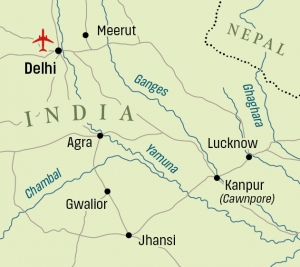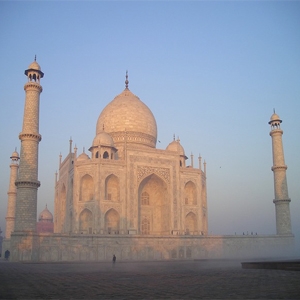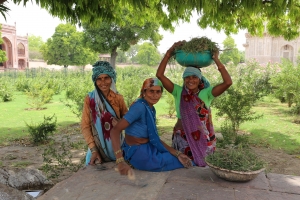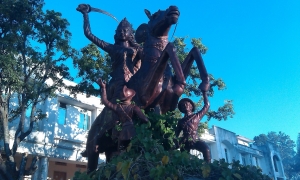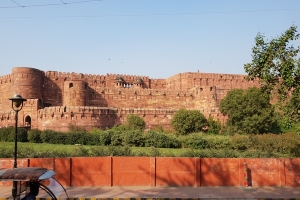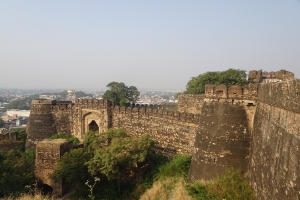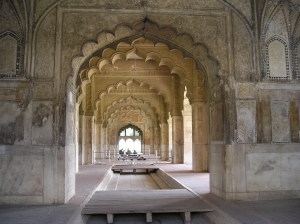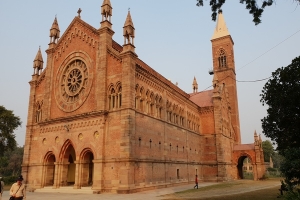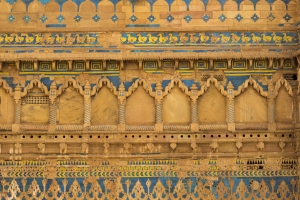
The Indian Mutiny
The British Raj gets a Wake-up Call
To be confirmed
The Indian Mutiny
The British Raj gets a Wake-up Call
Tour Introduction
During this fabulous exploration of the Indian states of New Delhi, Uttar and Madhya Pradesh you will see and walk the ground of one of the most critical periods in the history of India and the British Empire: the rising of 1857, the spark of independence achieved some 90 years later. Whilst you will enjoy the obvious splendour and beauty of the love inspired Taj Mahal and the stunning Mughal Red Forts in Delhi and Agra, we spoil you with a spectacle of other remarkable architectural riches all of which played pivotal roles in our dramatic tale. To describe but a few: the haunting honey-coloured ruins of Lucknow Residency surrounded by green manicured lawns; the stupendous La Martiniere College, a triumph of Indo-French architecture, surmounted with rearing lions and guarded by its imposing cannons; Cawnpore’s sombre All Souls Memorial Church, built as a thanks offering for the quelling of the Mutiny; the fading glory of Gwalior’s fortress with its intricately carved painted walls and domed towers standing resplendent above its town below. And whilst we will be staying in some fabulous five-star hotels throughout the tour, this will not mean that we do not get to see real and rural India. At the old cantonments at Meerut and Kanpur, echoes and vestiges of colonial times are abundant, many of the buildings still used by the Indian Army as they were originally intended whilst at the remote and rustic Kotah-ke-Serai you will be charmed by local villagers are they proudly show how, over time, they have imaginatively built their dwellings into the walls of this former outpost fort. An experience immersed in India’s diverse multi-racial, multi-faith, rich and colourful culture, not to mention, in our opinion, some of the world’s most delicious cuisine.
Background
In 1857 sixty-two well-trained infantry battalions and eight cavalry regiments of the Bengal Army mutinied and turned on their British officers in a frenzy of religious fervour – sparked off by the fact that new cartridges issued to the troops (the ends of which they had to bite off to charge their weapons) were believed to be greased with fat from cows and pigs – forbidden to Hindu and Muslim soldiers. Soon the mutinous soldiers were joined by disaffected elements of the civilian population – retrospectively venerated as early nationalists. For a time, British power in India – the jewel in the British Empire crown – hung by a thread. With so much at stake on both sides, it was a near run thing, with bravery and treachery in equal measure, and larger-than-life characters on each side - but in the end the rising was defeated, largely by loyal Indian and Gurkha troops and the leadership of their British officers.
Highlights
- See where the Mutiny broke out in Meerut
- The wonderful Taj Mahal and Red Fort in Agra
- The magnificently situated and stunning Gwalior Fortress
- Visit rustic Indian villages
- Wonderful hotels and great cuisine
- Poignant Lucknow Residency and La Martiniere College
- Sorrowful Cawnpore
- Extensive tour of Victorian Delhi
- Lutyens New Delhi and the Delhi Gate
What's Included
- Expert historians throughout providing a daily variety of talks, presentations and Q&A
- 3,4 & 5 Star Hotels
- Dinner parties hosted by your expert historians and tour manager
- Buffet breakfast each morning
- All lunches
- Entrance fees for sites included in itinerary
- Return flights from London (optional)
- Internal flight(s)
- Dedicated Tour Manager
- Helpful and friendly travel advice
- Modern, comfortable, air-conditioned coach
- The company of like-minded travelers
- Two drinks i,e wine or beer at each dinner and a welcome drink on first evening
"The tour more than met our expectations and the quality & approachability of the guide, Gordan Corrigan, was exceptional"
Itinerary
Day 0 - Depart London.
Day 1 – Delhi – Meerut
Arrive Delhi after midnight (local time) and check-in to our hotel, to get a late night’s sleep. After a welcome lie-in and an orientation lecture ‘1857 The Background’, we set off late morning for Meerut arriving in time to orientate ourselves in this attractive former garrison and site of the British Cantonment where the mutiny first broke out. Check-in to our hotel for one night.
Day 2 – Meerut
We continue our exploration of Meerut by visiting the parade ground where the refusal to accept the cartridges sparked off the mutiny; St John’s Church, where evensong was in progress when violence broke out; the Commandant’s house, where British officers took shelter from the mutineers in the latrines; the cemetery, where some of the British victims are buried and the Memorial Park built after independence to glorify the mutineers – an interesting dichotomy which we will explore during the tour. Depart mid-afternoon for the drive down to Agra where we check-in to our hotel for two nights.
Day 3 – Agra
We spend a relaxing day in Agra, one of the great fortified palace complexes of India, where we visit the unmissable Taj Mahal, one of the Seven Wonders of the Modern World. After lunch we pick up the story of the mutiny at Agra’s beautiful Red Fort with its marbled halls and formal gardens and which, in 1857, was a refuge for more than 5,000 Europeans and their Indian servants.
Day 4 – Gwalior
We travel on to Gwalior, seat of the Scindia Mahrattas and tour the stunning fortress, captured by the rebels in 1858, and visit the site of the skirmish at Kotah ke Serai where the Rani of Jhansi was eventually killed. Check-in to our hotel for one night.
Day 5 – Jhansi
On to beautiful Jhansi to see its impressive fort and learn more about the extraordinary career of Lakshmibai, the 29-year-old widowed Rani of Jhansi – whose palace still survives – and who may or may not have been responsible for the infamous massacre of the British Garrison and their families. Check-in to our hotel at the riverside just outside the city of Orchha.
Day 6 – Kanpur (Cawnpore)
Drive to Kanpur where we examine the siege of General Wheeler’s makeshift mud entrenchment and pay a melancholy visit to the memorial church with its mutiny memorials. We follow the poignant route of the Garrison’s survivors down the Sati Chaur Ghat and the Bibighar Well where the corpses of the butchered women and children were dumped. Check-in to our hotel for one night.
Day 7– Kanpur/Lucknow
Continue our exploration of fascinating Kanpur in the morning and then drive on to Lucknow, once the richest city in India, later that day. Check-in to our hotel that evening for two nights.
Day 8 – Lucknow
Although slightly marred now by modern industrial development there is still ample evidence of Lucknow’s former Mogul splendour and of the Mutiny for us to explore, including the Kaisarbagh (or King’s Palace); the Secunderbagh Gardens where more than 2,000 rebels perished when the British stormed it in 1857; and the famous British Residency compound where the besieged garrison held out until they were relieved in 1858 – an epic feat which became a symbol of British courage and endurance. The effects of the siege are still visible, and the place has great atmosphere.
Day 9 – Delhi from the British Perspective
We take the morning flight to Delhi and after an early lunch we start our tour by discussing how the capital reacted to the outbreak of the Mutiny. We visit the powder magazine blown up by the guard rather than allow its capture; the telegraph office from whence news of the Mutiny was communicated to the Punjab; St James’s Church built by the colourful Colonel James Skinner (who founded Skinner’s Horse, the famous Indian Cavalry Regiment) and looted by the rebels; Delhi Ridge from where the British conducted the siege operation to recover the city from the mutineers, the Kashmir Gate, through which British and Gurkha troops stormed the city and the grave of that extraordinary Victorian, Brigadier General John Nicholson, killed in the storming of the city. Check-in to the magnificent colonial Oberoi Maidens hotel for our final two nights.
Day 10 – Delhi from the rebel perspective
This morning we complete the story by looking at the siege from the rebel’s perspective; we visit Delhi’s magnificent Red Fort, headquarters of the rebels during the Mutiny and the tomb of Humayan, the son of Babur and the second Moghul emperor, where Major William Hodson arrested the sons of Bahadur Shah, the figurehead of the rising. There will be an opportunity to view the magnificent Lutyens architecture of New Delhi and/or do some sightseeing later in the afternoon before a leisurely final meal together that evening.
Day 11 – Take the morning flight to London.
Recommended Reading List
- Mutiny and Insurgency in India 1857-58: The British Army in a Bloody Civil War
- The Indian Mutiny
- The Last Mughal: The Fall of Delhi, 1857
Photo Gallery
Your Holiday Essentials
To be confirmed
click here to register your interest
Tour Reviews
View our latest Indian Mutiny tour images here
Take a look at some of the images taken on our most recent tour
Take a look at some independent reviews of this tour by previous participants here

